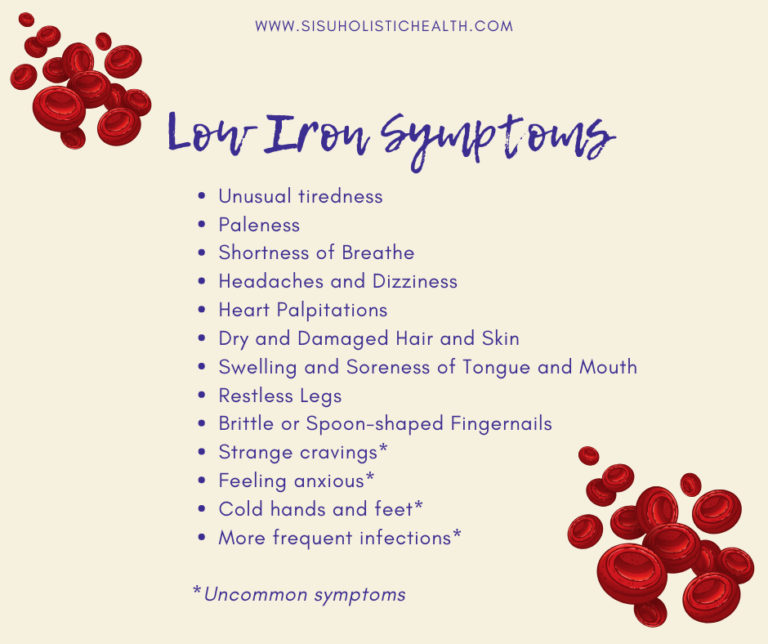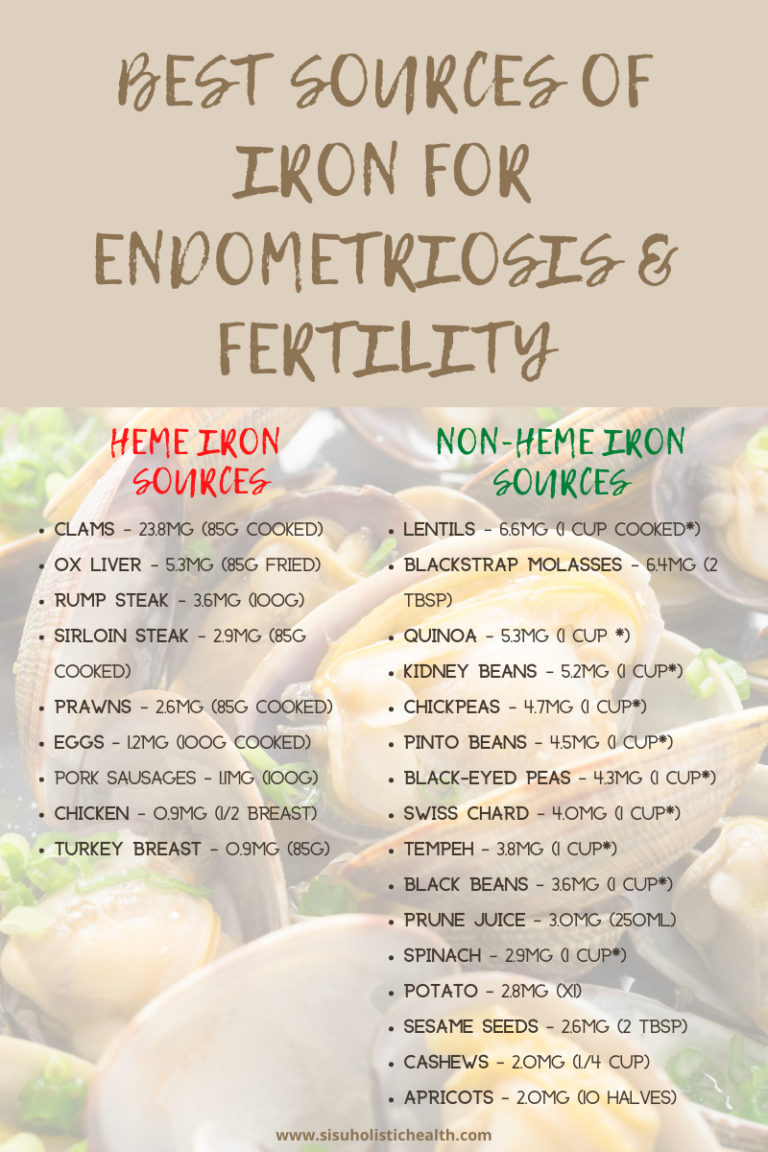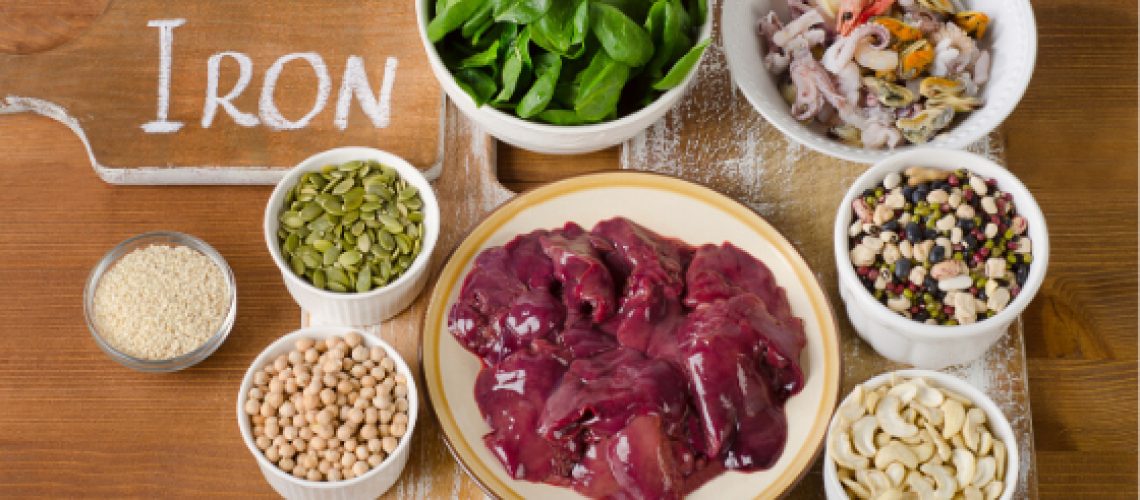
Have you been feeling tired, cold, weak, short of breath and / or dizzy? Do you have heavy periods because you have Endometriosis? Are you also struggling to get pregnant? If thats a YES, then you could have low iron stores or even iron deficiency anemia. This is not uncommon, as it is infact the most common nutrient deficiency in the UK, USA and even worldwide, and the most common deficiency in women of reproductive age!
Many of us know that iron deficiency is not a good thing, but not many know that it is super important for fertility. This might be because even many doctors do not see the significance in having adequate iron stores when we are trying to conceive.
Iron is one of the most important trace minerals required by our bodies and it critical to human life. It has so many functions throughout our body, primarily to carry oxygen in our blood. So if we are low in iron, then we will be low in adequate oxygen being delivered to our body tissues. If this is the case, how do we expect to get pregnant or sustain a pregnancy? If we do not have enough iron, it can have profound effects on our fertility, particularly combined with if you have Endometriosis.
Is it time to get your iron tested?
What Is Iron and How Does the Body Use It?
Iron is a mineral that is vital to the function of our red blood cells (RBCs). It is needed for both the making of red blood cells and by haemoglobin – which is a protein that transports oxygen from the lungs in the blood to the body’s tissues, and carbon dioxide from the tissues to the lungs.
Iron is also required for energy production and metabolism (the conversion of food to energy) and DNA synthesis (the creation of DNA, i.e. the genetic codes that exist in every cell of our bodies). If you are short on iron it can lead to iron deficiency anaemia, which can then can cause some serious health issues.
Iron deficiency and fertility
Iron is undertstood to be critical for fertility, pregnancy and breastfeeding. Studies have shown that iron deficiency has been linked to infertility, difficulty or delay in conceiving, miscarriage, low birth weight and preterm labour.
Early symptoms lead to fatigue and foggy brain, but before these symptoms develop the lack of iron can affect our ovaries and eggs. If our ovaries are not receiving enough oxygen, then it can prevent ovulation and even affect the quality of maturing eggs. In addition to the requirement of oxygen, if a woman has insufficient iron then there will be problems with energy production and DNA synthesis, both of which are essential in the maturation of eggs in the ovaries and the development of a fertilised egg into a foetus, and then into a baby.
Everyone knows that iron is essential during pregnancy – it is one of the first things the doctor tests for once you are pregnant. Statistics are that a 1/3 of pregnant women are iron deficient. So WHY wait until you are pregnant! It makes sense to reduce the risk of becoming anaemic during pregnancy and causing complications for your baby, by ensuring your iron stores are optimum, both helping you to conceive and also to maintain a healthy pregnancy.
Why Might Your Iron Be Low?
There are many reasons for why your iron could be low, it could be:
- Due to an increased iron requirement,
- Inadequate dietary intake,
- Chronic diarrhoea,
- Diminished iron absorption or utilization,
- Excessive blood loss through menstruation, haemorrhoids, ulcers etc, or
- A combination of the above.
There are several different categories of women that could be at risk of low iron, those that are of the highest risk:
- Women with heavy periods, as more blood loss results in more iron loss. This means women with Endometriosis, fibroids, haemorrhoids, estrogen dominance or generally heavy periods may have issues of conceiving just based on iron levels, regardless of other issues associated with their condition.
- Pregnant or recently pregnant women – you require a lot of iron during pregnancy, post-partum and breastfeeding. These women may have depleted stores that have not yet been replenished.
- Physically active women – if you are highly active you will be needing more oxygen to your muscles and require more iron to carry the oxygen.
- Vegetarian or vegans – iron from plant sources (non-heme) is not as readily available to the body as from meat sources. There is a risk of low iron stores if a concerted effort to ensure iron uptake is good.
- Women with poor digestive function – iron is absorbed through the intestinal lining. If you have a damaged gut, then you could have a malabsorption issue, this is particularly the case for women with celiac disease or gluten intolerance / sensitivity – under which many women with Endometriosis fall under.
If you have Endometriosis and you are bleeding heavily, you are losing more blood than is normal. This could be lowering your iron levels if you are not supplementing or eating a high iron diet. Another reason why you might have low iron stores, is that women with Endo more often than not have a number of issues with their digestive system. It could be possible you have a malabsorption issue. This is usually evident if you have an adequate consumption of iron, and yet you have low iron stores (i.e. serum ferritin). It could be you have low levels of hydrochloric acid, not enough gastrointestinal enzymes or have a damaged stomach lining and inflammation. This is why it is so important to be a detective and find out the root causes to your Endometriosis and fertility. There may be more than one reason why you are having fertility problems.
The Effects of Low Iron
The main negative effects of low iron are due to the decreased delivery of oxygen to the body’s tissues – this can then result in poor activity of iron containing enzymes in various tissues.
Iron deficiency can lead to anaemia, excessive menstrual blood loss, learning disabilities, impaired immune function, and decreased energy levels and physical performance.
Low iron has been shown to affect fertility – so if you suspect you have low iron – go get tested NOW!
The Symptoms of Low Iron
The first symptoms to be noticed with low iron levels are low energy due to the depletion of iron needed by enzymes involved in energy production and metabolism.

The symptoms of anaemia, the last stage of iron deficiency – is extreme fatigue – as this is because your body tissues are not getting enough oxygen and are getting a build-up of toxins such as carbon dioxide.
Testing Your Iron Levels
It is really important to get your iron levels checked. Ideally these should be checked right at the beginning of your fertility journey – even before you think you have a problem. If you know you want to get pregnant, I would check this just to make sure you have enough.
The key thing to get tested is your Serum Ferritin (this is the measure of stored form of iron – particularly in your liver), not just the normal Complete Blood Count (CBC) and haemoglobin. It is quite possible to have normal levels of CBC and haemoglobin but to have low ferritin or ‘normal’ but on the low side.
According to Dr. Murray and Dr Pizzorno (2005) in the Encyclopedia of Healing Foods, there are many researchers who have clearly shown that even a slight iron-deficiency anemia leads to a reduction in physical work capacity and productivity. So what does it do for fertility!!!
Optimal iron levels for fertility
What I find funny, is that it is routine in the UK, USA and many other countries to test your iron levels during pregnancy as they can be low. So why on earth do many doctors not understand that it should be essential to ensure you have ‘optimal levels’ of iron to cope with the iron demand during pregnancy. Surely it would be better than reacting later during pregnancy and increasing the chances of constipation, as women are then put on poor quality synthetic iron tablets? Which is an added burden you do not need when you are pregnant…
The range for serum ferritin is 20-204ng/mL. You want your levels to be above 40 or 50ng/mL, preferably around 70ng/mL if you want to get pregnant. So if you are low 20’s and the doctor says you are fine as you are not below the range, then you need to try to argue that this is not fine, especially if you have limited time, such as you are going for IVF very soon. You want them to help you increase your iron stores as quickly as possible.
What To Do If Your Iron Is Low
Food sources
There are two forms of dietary iron, “heme” iron and “non-heme” iron. Heme iron is found in animal products and is the most readily absorbed form of iron. Non-heme iron is found in plant foods and is more difficult to absorb.
Make sure you are focusing on iron rich foods from meat sources (i.e. heme), such as from red or dark meat sources such as beef, buffalo, lamb, deer, and also organ meet like liver. Interestingly, clams are ridiculously high in iron. Just make sure they are from a good source, as they could have various heavy metals if they come from polluted rivers and seas.
As a suggestion, you could have red meat (preferably grass-fed, local and organic) at least twice a week, white meat / fish twice a week, and liver pate (organic) more regularly, perhaps every other day. At least one egg (organic free range) daily.
There are various plant sources of iron, but if you have very low stores, these will not bring up those stores very quickly. If you are a vegetarian or vegan – you might want to consider changing your diet (if you can) to include meat or you will have to take high dose good quality supplement.
It is important to make sure you do not consume dairy products or caffeine at the same time as when you are eating foods high in iron as this can significantly reduce the absorption of iron. If you can eat something citrusy, as Vitamin C is great for increasing the absorption of iron. There are many more food combinations that help or hinder the absorption of iron and if you are very low it is a good idea to find out what these are.

Supplementation
You want to be careful self-supplementing, as there are various sources of iron (iron sulphate, gluconate, and fumurate), that can be poorly absorbed and have detrimental effects to your stomach, in particular Iron Sulphate. This is typically the prescribed form! The prescribed amount for women is 20mg though if you have an issue with malabsorption you may require more.
Remember, if you do supplement, you will need to do so away from caffeine, dairy, any supplements that contain calcium, magnesium or phosphorus, and any antacids – at least 1-2 hours. Ideally you want to take your iron tablets between meals or before bed.
It is also possible to take too much iron if you are taking synthetic forms of iron, which is the majority of iron supplements. Symptoms of taking high doses of iron (i.e. more than 20mg for women) are:
- Constipation,
- Feeling sick,
- Vomiting
- Stomach pain.
This is why it is important to try to work with your doctor as best as you can to increase your iron stores – though I understand they can be very unhelpful. If you doctor is not registering the importance, then request to change doctors in the first instance. If not, then work with another health professional, whether it be a naturopathic doctor, nutritionist, or health coach.
I can recommend Wild Nutrition if you live in the UK. They are an amazing company, their founder and formulator is Henrietta Norton, an Endometriosis sufferer – so they know their stuff when it comes to Endo. Henrietta and her team have developed a series of food grown supplementation, which is highly effective. They have studied the bioavailability of the nutrients and also combine them with other nutrients to ensure their uptake and effectiveness is as best as possible. Also as they are from food, the body recognises them and it is not possible to overdose on them as your body will just excrete any excess as it would do with food.
I am a Wild Nutrition practitioner and you can order supplements through me with a 15% discount. This is particularly good if you live outside the UK – as they currently do not deliver outside the UK, whereas I can post them out for you.
There are also many other good brands, as there are bad brands. Make sure to do your research and not just pick and iron that is the cheapest, as it is unlikely to be effective and could do you some damage if you are taking in a high quantity.
High Iron Levels and Endometriosis
If you happen to have high iron levels, and these are bordering or over the upper limits for women in your age group, it could be you have a disease called Haemechromatosis. If you want to read more, I wrote an article for Nicole Jardim (The Period Girl) last year “How your period could be hiding that you have hereditary hemochromatosis“.
If you need help
If you find you have low iron and your levels are not coming up having made amendments to your diet and you are supplementing then you may have a malabsorption issue or something else.
I can work with you to get to the bottom of this root cause. I offer:
- A 2 hour deep-dive session
- 1:1 EndoFertility coaching program to work on this and other issues you may have with your EndoFertility.
Book yourself onto a free consultation below.


